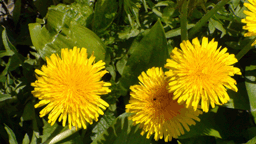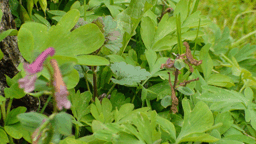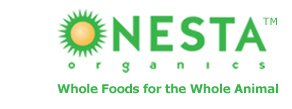
What ingredients do we use and how do we process them?
Our certified organic raw pet food products are handcrafted from fresh or low-temperature (i.e., raw food temperature) dehydrated, nutritious, human grade, raw organic ingredients.* We also use whole foods instead of synthetic nutrients or refined ingredients.
Gentle dehydration at raw food temperature preserves the natural nutrients contained in our ingredients, yielding raw pet foods that are formulated to support your pet's health and help prevent disease.
* Caution! Some pet food manufacturers market their 'dehydrated raw' products as raw even though they use cooked meats, fish or eggs as ingredients.
What are some of the key ingredients pet owners should look for when buying pet food?
We recommend certified organic pet foods made from whole food ingredients that have been minimally processed. Such foods will be safer and healthier for your cat, dog or other pet than conventional (non-organic), heat-treated foods that contain food fragments. Please read more about organic foods on our Blog and News page.
Ingredients should be species-appropriate. For example, cats are obligate carnivores. Dogs are omnivores, but evolved on diets high in animal protein. Disproportionate and widespread use of grains may be one of the major reasons that many cats and dogs develop allergies, food sensitivities, obesity, diabetes, chronic infections and inflammation, including cancer. Unfortunately, a large number of food products for these animals contain large amounts of grains; this is something that consumers should watch for when choosing foods and treats for their pets.
Ingredients should be human-grade. This is especially important if the product is not USDA certified organic, as organic certification ensures full traceability of each ingredient from your dog's food dish to the farm where the ingredient came from.
Look past the front label. The term 'natural,' as it appears on many pet food labels, only means that the product contains the actual ingredient, and not a synthetic version. Thus, a product claiming that it is 'made with natural chicken' may contain little more than 3% chicken, which could have been raised with the use of antibiotics and genetically engineered feed. Ingredient panels must list their ingredients in descending order of quantity. Reading the ingredients panel will let you know which ingredients are most prevalent in your pet's food.
Don't buy foods that are overly processed, or that contain so-called 'refined' ingredients. Refined ingredients, such as refined grain flours (which are often marketed as 'grains') are stripped of many of their nutrients; removal of nutrients makes the remaining bulk of these ingredients nutritionally inadequate (e.g., high in calories, low in fiber and nutrients, or simply more allergenic). Most pet foods are processed with high temperatures, which destroy most nutrients and make other ingredients unhealthy (e.g., many fats and oils are unstable at high temperature). It is worth noting that some dog and cat food manufacturers use previously cooked ingredients (mostly meat and fish) in their dehydrated pet food products.
Stay away from ingredients that are obviously unhealthy. This includes sweeteners, including honey (generally, honey used in pet foods or treats is neither raw nor certified organic, which makes it nutritionally equivalent to non-organic sugar). Sugars have no business being part of a pet's staple diet; they only contribute to the explosion of pathologies in our pet population that were all but unknown just a few short decades ago (e.g., obesity, diabetes, arthritis, cancer).
| | 
Where do our pet food ingredients come from?
Whenever possible, we use local and fair trade ingredients. We are always on the lookout for the healthiest and most sustainable ingredient sources for our pet food products.
Unlike the information provided by pet food companies that don't sell certified organic pet foods, the information that we provide can be verified by an unbiased organic certification agent. With this in mind, you can rest assured that our certified organic pet foods really do contain ingredients from the countries we list below.
Please note that the following is a complete list of all ingredients we use in our cat, dog, or rodent foods. Would we use any of the vitamin and mineral premixes which are used in 'AAFCO-approved' pet foods, then we'd have to list them under a 'China header' because most isolated/synthetic nutrients (i.e., vitamins and minerals) are made in China (even those used in supplements for human consumption). So far, I have not seen one pet food company disclose in which country the premixes they use were made in.
Canada
Citric Acid (certified non-GMO)
Hemp protein (organic, certified organic by QAI)
Hemp seeds (organic, certified organic by OTCO)
Iceland
Kelp (organic, certified organic by OTCO)
India
Spirulina (organic, certified organic by OTCO)
Indonesia
Cinnamon (organic, certified organic by OTCO)
South America
Bananas (fair trade, organic, certified organic by CCOF)
Quinoa flour (organic, certified organic by QAI)
Quinoa seeds (organic, certified organic by QAI)
USA
Alfalfa (organic, certified organic by OTCO)
Barley grass (organic, certified organic by OTCO)
Calcium Carbonate
Carrot (organic, certified organic by QAI)
Chicken (organic, pasture-raised, free-range, certified organic by Organic Certifiers, MOSA).*
Durum flour (whole, organic, certified by Montana Certified Organic)
Flax seeds (organic, certified organic by OTCO)
Green Peas (organic, certified organic by WSDA)
Kamut flour (whole, organic, certified by Montana Certified Organic)
Lecithin (organic, certified organic by OTCO)
Millet grain (organic, certified organic by QAI)
Sardines (wild, sustainably fished)
Spelt flour (whole, organic, Montana Certified Organic, QAI)
Spinach (organic, certified organic by OTCO)
Trout (sustainably farmed, organic feed)
Turkey (organic, pasture-raised, free-range, certified organic by OTCO, MOSA)**
Wheatgrass (organic, certified organic by OTCO)
---------------------------------------------
* The Humane Society of the United States has declared our chicken as far above industry standards, in respect to humane methods used in both raising and processing of the birds. Human testers call them 'best chicken ever,' and our cats and dogs confirm this statement!
** Our turkey farmers process their pastured birds with top quality standards which decrease dangers of contamination.
|



